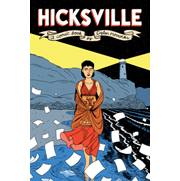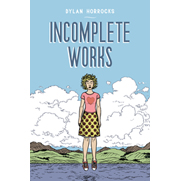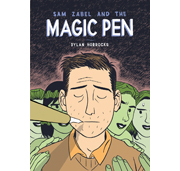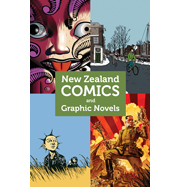
I recently did an interview with Daniela Odri Mazza for Conversazioni sul Fumetto, an impressive looking Italian blog. My answers were translated into Italian, but I really enjoyed Daniela’s thoughtful questions and we agreed it would be nice to post the interview in English too.
And so here it is.
(By the way: here’s the Italian edition of Hicksville, from Black Velvet).
Daniela: The first question I have is about a guiding theme throughout the story: the map, mapping and the description of the world. What fascinates you so much to make this theme omnipresent in the book, in the main story and several subtracks and stories? What do you think, about comics as “creators of worlds, universes?”
Dylan: I’ve always loved maps, and especially imaginary maps, like the ones you find in fantasy novels and games. When I was writing Hicksville, I was very interested in spatial vs. temporal ideas of narrative: geography vs. history. All of this fed into Hicksville, and I started thinking of stories (comics, novels, histories) as a way of mapping worlds – real and imaginary. The thing about maps is that they are always fictions, more or less. A map isn’t an actual landscape, it’s a representation of a landscape, and so it’s always a simplification, a simulation, an artificial model. It’s a way of talking about the landscape. It tells a story about place.
Comics are especially interesting as maps, because they can use pictures, diagrams, words. They can talk about a landscape (in space or time) in very complex and interesting ways. Many cartoonists have played with this (some consciously, some by accident); Chris Ware is a good example.
Daniela: In this regard, what about the figure of Emil Kopel, the cartoonist of Cornucopia? (If I’m not mistaken he is the protagonist of a subsequent series, “Atlas”, which is a spin-off of Hicksville…)
Dylan: Kopen appears only briefly in Hicksville; he pushed his way into the story when I was beginning to think about themes which weren’t central to the Hicksville plot, but which became more important to me as time went on. I used Kopen to explore ideas about mapping, and about the relationship between place and story, space and time, geography and history. I was starting to become tired of the over-emphasis on “story” and “story-telling” when people talked about comics. At the time, many comics critics and cartoonists themselves were very keen to talk about comics as a story-telling medium – rather than as visual art or drawing. The emphasis in interviews and discussions and articles was often on whether a comic told a good story, and how well it told it. I felt this was only addressing a small part of what comics are and what they do. So partly I was reacting against that.
But I was also becoming suspicious of story itself. I was finding it harder and harder to read novels, and was drawn to non-fiction and to other kinds of narrative and art. This was the beginning of a long period when I lost my faith in fiction, and in story-telling. It really was like a crisis of faith. I began to feel that stories are – above all – lies, and that although these lies can be beautiful and seductive and persuasive, they deceive us into thinking the world works in ways that it doesn’t. Stories beguile and enchant us, and that power can be used to trick us into believing all kinds of things that are false and even dangerous.
For example, I think fascism is partly a collection of stories; it presents a version of history and a narrative about how the world works, about heroes and villains and good and evil, built around values that are consistent with the fictional world it describes. A lot of politics works that way; politics is partly an art form, made of fiction and rhetoric and metaphor and myth. Novels, poems, comics, films – all of these stories we tell ourselves – have the power to shape how we view the world. And they do this essentially by lying.
So, when I wrote about Kopen preferring stories about space, rather than about time, I was beginning to explore all of these doubts. I was asking what it means to see comics as maps, rather than stories – as a way to create imaginary spaces, rather than trying to unfold a narrative. After Hicksville was published, I went back to Kopen, and began writing and drawing Atlas, which goes deeper into all of those questions. I drew a couple of hundred pages and then set it aside, but I still want to finish it one day.
As well as being a cartoonist and a cartographer, Kopen is a magician. He understands that stories are a kind of magic, a spell. They don’t tell us how the real world works; instead they enchant us, drawing us into imaginary realities that have the power to transform us and so transform the world.
Much of what I’ve written and drawn in the past few years explores the dangers, pleasures and moral dilemmas of how we use that power.
Daniela: Returning to the structure of your graphic novel, through the different levels of interpretation you tell us everything that goes around the comics world: from artists to journalists, to the mechanisms of business (especially in the American publishing system), in an interesting mix of truth and fiction (including the useful appendix with a glossary and notes). I read that some people called Hicksville a sort of “mockumentary”… Do you go along with this definition? And what do you think about graphic journalism, which is very popular today; what about using comics to tell the real?
Dylan: I don’t think of Hicksville as a mockumentary, but the idea makes me smile.
I never thought of it as a truthful account of the history of comics; instead I wanted to explore an imaginary landscape and history of comics – just as I also include an imaginary history of New Zealand (Captain Cook & Hone Heke could never have met, as they lived in different centuries). Hicksville is full of these imaginary landscapes and histories – especially utopian daydreams. I love utopias, because they allow us to explore what we wish the world was like, which helps us to liberate ourselves from thinking it always has to be the way it is now. Hicksville is about setting out into the unknown and the unrealised: creating a new world out of dreams and wishes and daydreams.
Graphic journalism does something very different – almost the opposite. Cartoonists like Joe Sacco are engaging in a very rigorous, robust conversation with reality as it is. Of course their comics (which are, after all, stories) are on some level fictions. But they’re fictions formed through this (hopefully) honest and careful attempt to be truthful, which is a very different thing to what I was doing in Hicksville. I have enormous respect for graphic journalism – just as I have enormous respect for journalism in any form. I think many of the most important comics of the past 20 years have been journalism comics. But I don’t think such comics “tell the real” so much as they “converse with the real,” in a fascinating and powerful way.
Daniela: Also very interesting is the approach Hicksville takes to the history of comics. In your story Hicksville holds a secret knowledge, and Kupe, who is its guardian, makes it clear that there is a public history (of comics) written only by the victors, and then there are many other stories which are now lost to memory (despite comics being a relatively young medium).
Dylan: The history of comics I grew up with was mostly told by fans – and mostly by male American fans who’d fallen in love with comics as teenage boys, often in the 60s and 70s. It emphasised certain genres, artists, themes that appealed to them. In the last decade, that history has begun to become much more diverse and open, as other genres, styles and artists are being written about and brought back into print. It’s a very exciting time.
But you raise an interesting point. In Hicksville there are two histories being explored: the history of comics and the history of New Zealand. New Zealand is a colonial country, and our history has mostly been written by the colonisers. The sequence in Hicksville where Captain Cook and Hone Heke are trying to locate New Zealand on the map is really about what’s been happening in New Zealand historiography over the last generation or so: Pakeha (i.e. European-descent) and Maori New Zealanders have struggled to redefine the history of the country from different perspectives and with different agendas. The debates have partly been about where we’ve come from, but above all they’re about where we’re going.
Just as journalism is a conversation with the real, history is a conversation with the past. Hicksville is partly an attempt to see what happens when we allow that conversation to include the imaginary: daydreams and whimsy, what if’s and wishes.
Daniela: If you could choose, what are the comics of today you would definitely pass on to future generations?
Dylan: All of them. From the award-winning literary masterpieces to the cheap disposable franchise tie-ins; from great works by famous cartoonists to unpublished and unfinished silly cartoons in school children’s notebooks. Comics is all of them; they are all equally representative of the medium, and any of them could one day change the way someone sees the world.
Or none of them. In a billion years, none of them will still be here. I don’t mind.
Daniela: Do you think the internet and online publications will enhance the potential of the medium, or maybe transform the management of the historical memory of comics and give visibility to stories that otherwise would never be told?
Dylan: I think the internet provides us with unprecedented opportunities in so many ways, it’s impossible to sum up. We’ve barely begun to scratch the surface of what it will mean for human society, let alone for comics. Assuming we don’t bring civilisation crashing down around our ears first, of course.
One thing I’ve already noticed is an explosion of new and ever more diverse voices using comics to explore all sorts of things, and finding audiences no-one thought were out there.
Truly, we live in a Golden Age of comics.
Daniela: As an artist, you have had the difficult experience of dealing with a job that you did not feel represented you (you discuss this in the introduction to this volume and also through the character of Sam Zabel, another resident of Hicksville, who struggles with his strip “Pickle” (which was the name of your serialised project) and a difficult relationship with his publisher). What is your personal path to reconciling art, success and commerce?
Dylan: You would think that someone who wrote Hicksville would not make the mistake of working for a big corporate comics publisher, but it turns out I’m stupider than my own characters. I spent about 4 years writing comics for DC, and although some of it was fun, and it paid the bills, it nearly destroyed me as a cartoonist. I learned that I’m not the kind of writer who can write anything for a paycheck. Some people can take on that challenge, and use it to write great stories while still working within that system. I have a lot of respect for those people, but I found out I’m not one of them.
I guess my own personal path to reconciling art and business is to put art first, and to maintain my independence as much as possible. I really need to work on my own thing, rather than as a pen for hire. Especially for big media corporations; working for those guys is so fraught with moral compromise, it’s more than I can handle.
As a result, I’m much poorer financially, but I’m a hell of a lot happier.
Daniela: Curiously, there is a very sarcastic joke about comics criticism in your story when Grace, one of the residents of Hicksville, meets for the first time the journalist Leonard Batts, who is lost in the countryside. She says: “What – you write about comics? … Weirdest fucken job I ever heard of.” What do you think of writing about comics? What is the role of criticism today?
Dylan: Grace is being ironic, of course; she’s the one person in Hicksville who’s skeptical about comics.
I love intelligent, interesting writing about comics. The kind I love the most is either informative (it tells me stuff about the history or landscape of comics that I didn’t know), or explorative (it’s trying to dig deeper and to find new ways of looking at or understanding something about comics and/or life). There’s a lot of great stuff out there now that does both, and the internet has helped. At the moment, I enjoy reading Tom Spurgeon, Jeet Heer, Heidi McDonald and David Brothers (among many others), but I also enjoy the fascinating unpredictable staccato discussions that rise up on twitter now and then, with all kinds of people chiming in (from famous cartoonists to teenage fans), producing unexpected insights before fading away.
I have almost no interest in criticism as a way of establishing which comics are “good” or “bad.” I really don’t care; I’m more interested in thinking about comics than deciding which ones deserve a prize.
Daniela: One thing that strikes all readers of Hicksville is certainly the series of beautiful quotations from the great masters of comics which open each chapter. The first that comes to mind is that of Jack Kirby: “Comics will break your heart.” But I was also impressed by that of Will Eisner: “When someone asks me what got me into comics, I can only think of one word: malnutrition.” To read this today seems to me a clear sign of changing times. What do you think?
Dylan: Yeah, things have changed enormously – even since I was drawing Hicksville in the 1990s. These days, the corporate comics industry in America is a shadow of its former self, while the “alternative” comics world of graphic novels and personal idiosyncratic art has grown and grown to become a significant part of the cultural landscape and the book world. There are new challenges today, of course, and Kirby’s warning (which was also echoed by Charles Schulz and other cartoonists who said similar things) is still relevant to young artists dreaming of their first graphic novel.
Comics have changed enormously, but art is still a dangerous business. Take care out there, folks…
















